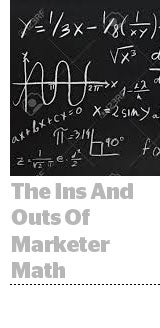 Marketers love data, but there are still ways it can fail them.
Marketers love data, but there are still ways it can fail them.
Marketers need to push themselves and their agencies to be accountable for sales, not false metrics often used as proxies for actual sales, said speakers at the ANA’s Masters of Marketing conference in Orlando, Fla., this week.
“My No. 1 goal is to align agency and client objectives,” said Humberto Muccilli, category manager for global marketing procurement at pharma company Bristol-Myers Squibb. That means agencies are driving to the same things the marketers ultimately want: sales.
For all the talk about data, it can fail marketers in multiple ways. It’s not unusual for marketers to see positive metrics from their agency, but declines in sales.
Or marketers who want to experiment with newer, less measurable forms of marketing can feel pushback from others who want more reliable, tested forms of marketing.
Because Taco Bell is focused on reaching a millennial audience, it frequently is the first advertiser in new mobile apps that often lack measurement.
“Don’t be afraid for the measurement to catch up, because a lot of this has to be your gut instinct,” said Juliet Corsinita, VP of media and brand partnerships, at the conference. “While I would love for measurement to be expanded, you can’t wait. You have to use the instincts you know.”
But while Taco Bell can’t always measure the impact of a campaign in a place like Snapchat, it looks at sales data regularly. “It’s great that someone engaged with our ad, but did we sell enough tacos today?” said Taco Bell media director Cheryl Gresham.
But even where data is available, are marketers drawing the right conclusions?
During a speech at the conference, Internet personality and Vaynerchuk Media founder Gary Vaynerchuk argued that marketing objectives don’t often align with sales. “We trade on data that can be manipulated to do anything you want,” he said.
He railed against programmatic, saying the ad exchanges trade on math that doesn’t add up, and that banner ads – because of their intrusiveness – have a negative impact on sales. Vaynerchuk also said marketers – often under the directive of the CEO – spend too much on TV and expect other mediums to be measured and perform just like TV does.
While marketers in attendance sympathized with his points, many were reluctant to discount the effectiveness – and predictability – of traditional media.
“I don’t agree that TV and banner ads are nonsense as he portrays,” Muccilli said. Sure, TV is “less effective than it was decades ago, but it’s still a powerful channel.”
Brian Wieser, senior analyst at Pivotal Research Group, also argued banner ads are effective in certain situations.
Marketers are also breaking new ground in measuring media that wouldn’t have been measurable before.
Nissan, which has an all-encompassing college football partnership with ESPN, has been using Rentrak to measure when its stadium billboards appear on the screen, according to Jeremy Tucker, VP of marketing communications and media for Nissan.
Its “Heisman House” campaign – a mix of multiple forms of media, from TV to experiential – not only garnered millions of impressions in various activations, it drove the bottom line too: It was directly responsible for 2% of Nissan’s sales.














